Conductor Gary Garner
A Conversation with Bruce Duffie
As this is being typed in July of 2017, I have been in Classical Music
Radio for over forty years. Currently it is just a single program
each week on WNUR-FM, but for just over twenty-five years (1975-2001),
it was my privilege to work full time as an announcer/producer with
WNIB, Classical 97, in Chicago. During that quarter-century I was
able do about 1600 interviews with classical musicians
— composers, conductors, singers, etc., — who came to The
Windy City for performances or other reasons. I also did a few of
these conversations on the telephone with older composers who were not
coming my way, and I gathered a few more on my travels to various
American cities, as well as mainland China! A full list of my
guests is HERE.
In August and September of 2003, my girlfriend, Kathy Cunningham, and I
made an extensive road trip. The first part was a re-creation of
the run made exactly one hundred years previously by my grandfather,
Lawrence Duffie, and others, which established the non-stop record time
of 76 hours in a gasoline automobile from Chicago to New York.
Their exploits in various Columbia Automobiles, which were built in
Hartford, CT, from 1896-1913, are shown on several webpages beginning HERE. The
1903 record is shown HERE.
While we did not adhere exactly to their route, we were told by local
people along the way that many of the roads we used were, indeed,
present one century earlier. We took our time and enjoyed the
trip, rather than try any kind of non-stop race as had been done in the
previous century. I also did a few interviews with musicians
while we were in the New England.
After that, we headed south to visit my father, Burton Duffie (Lawrence’s
son), then almost ninety-six years old, where he was living in a
retirement center in Delray Beach, Florida.
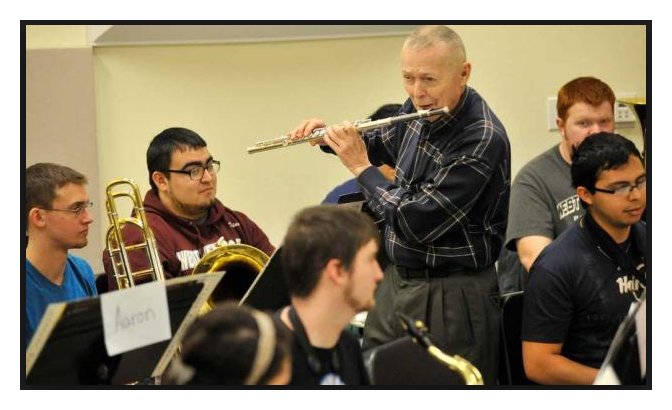 The
next leg of our journey was west, across the deep south to Texas,
to visit Kathy’s
mother in Plainview. It was there that Kathy, a graduate of WT,
and who had played clarinet in Garner’s
ensemble for several years, contacted her former bandmaster and
arranged for this interview before we headed back home to Chicago.
The
next leg of our journey was west, across the deep south to Texas,
to visit Kathy’s
mother in Plainview. It was there that Kathy, a graduate of WT,
and who had played clarinet in Garner’s
ensemble for several years, contacted her former bandmaster and
arranged for this interview before we headed back home to Chicago.
When we arrived at his home in Amarillo, Garner greeted us warmly, and
we settled in for the conversation.
Here is
what was said that afternoon . . . . . . . . .
Bruce Duffie: We
will just chat about our favorite
subject. I assume your favorite subject is the same as mine, that
being music?
Gary Garner: You
would be correct.
BD: Is it
wonderful to look back now on a life
immersed in music?
GG: It is indeed,
yes. I wish I could do it all
again.
BD: Would you do
anything different?
GG: As far as
music is
concerned? Yes, I’d learn to play the piano. I’d
have probably studied a little harder as an undergraduate. No, I
would have studied a lot harder! [Both laugh] But my great
regret is that I never did learn to play the
piano. As many do, I had deluded myself into thinking that I was
going to be a band director, so I didn’t need to know how to play the
piano. I even conned the department head into letting me take
French in lieu of piano, which he shouldn’t have done. I thought
he was doing me a great favor, and he thought so
too, but in retrospect I realize that it was not the best of
decisions on my part.
BD: Aside from the
piano, is it safe to assume
that you can get around on all of the other wind, percussion and
stringed instrument to a certain extent?
GG: There were
obviously exceptions. Actually I started out as a baritone
saxophone
player. I didn’t intend to get in band at all, and I did it at
the behest of my two best friends who were in the band. I
started late, at the beginning of the school year, and the
only instrument they had left was a baritone sax, which was at least my
size. I had great difficulty in taking it home on my
bicycle. I persuaded my dad I needed a
smaller instrument, and that’s how I became a flute player, which was
the smallest thing I could find. So I began my musical life as a
flute player, and then gravitated in high school to the
saxophone, and then the clarinet so I could play in dance bands [see photo below].
I did those pretty seriously for a long time, and later on
picked up the oboe and bassoon. When I did a graduate
recital, and was working on a doctorate, I did a woodwind
recital where I played flute, oboe, clarinet, saxophone, bassoon.
I’ve played some trumpet and I can play the other brass instruments,
though I don’t know what I would sound like now. I was always a
poor snare drummer. I did work
on it for a while, but I never did accomplish a great deal.
BD: But in the
midst of all this you developed your
musicianship?
GG: I hope
so! I have a wide variety
of musical experiences, and they all contributed, in one way or
other, to one’s overall musical skills and perceptions. That’s a
lifelong pursuit. That never stops.
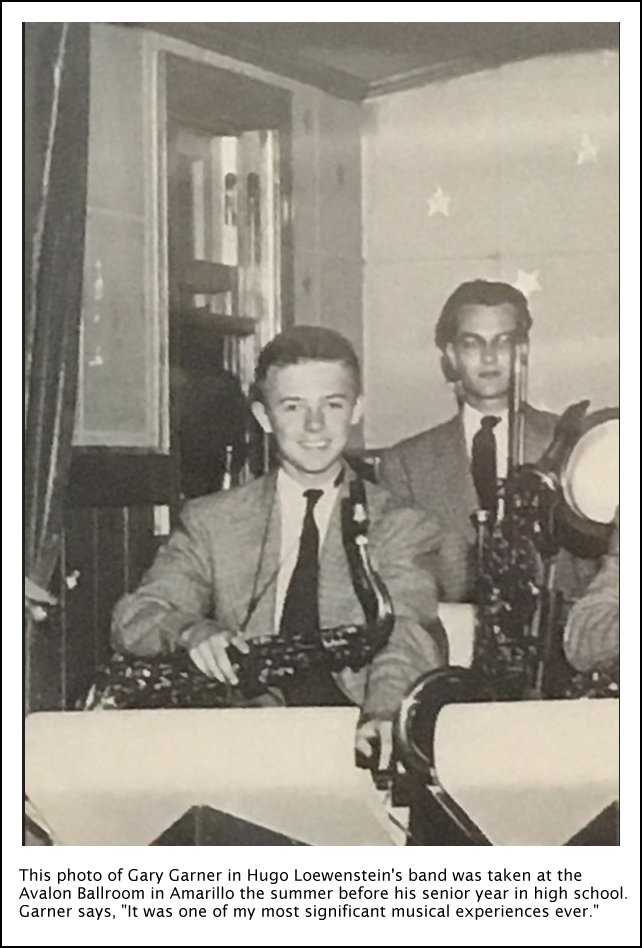 BD: When you were
directing
bands at WT, did you also conduct orchestras?
BD: When you were
directing
bands at WT, did you also conduct orchestras?
GG: Yes.
When I first went
there in 1963, my teaching assignment was as Band Director. Then
I taught all the woodwinds
except clarinet. We had a clarinet teacher, so I was teaching
oboe and bassoon and saxophone as well
as flute. Later we added a bassoonist and then later an
oboist, but the flute studio was growing all that time, and it
finally got to the point where I had twenty-five students in the flute
studio, plus doing the band, plus teaching some classes, which was more
than I could handle. I just felt that I was not doing
as good a job as I needed to do in anything because I was spread so
thin. So I reluctantly gave up the flute teaching at that
time. Then suddenly my schedule was wide open, and that also
coincided
with the departure of the orchestra director, so I also assumed
responsibility for the orchestra. Having had only limited
experience with stringed instruments, I did take violin lessons from
a member of our faculty for four years. I never did quite
reach the point I could stand to hear myself play, but it got a little
bit better and it accomplished its purpose. I learned enough
about strings to do a respectable job
with the orchestra.
BD: You were
leading ensembles of students who were learning, not quite yet
professional but
getting towards that level. You could impart a lot of musicality
to them and a lot of repertoire, I assume?
GG: We certainly
covered a lot of repertoire. I
don’t know what else they might have learned in there, but I hope
something...
BD: From the array
of band literature that is
available to you — and
I assume that it’s growing constantly — how do
you select which pieces to do this year or next year, or which ones you
won’t do at all?
GG: [Laughs]
You’re right about that, but I never looked quite that far ahead.
Many other conductors do, and they
have all my admiration, but I usually go one concert at a time.
There
are a lot of factors that go into the selection of
repertory, and you’re quite right, there are a lot of
pieces. I’d dare say most pieces I will never do
because my time’s too precious, and the time with the students is too
precious to do anything less than first-rate music.
BD: What is it
that makes a
piece of music first-rate?
GG: That’s a very
subjective
opinion. There are all sorts of things that go into it when I’m
selecting a piece of music to play. One is that I want
to expose the students to a variety of musical styles and periods. I’m
very
concerned with how idiomatic it is for the medium; how well
written it is for winds and percussion. That’s not quite so
subjective. The real subjective part of it
is in the harmonic content, the formal
content, the music itself. Is it well organized? Does it
make
sense? Is it appealing? That’s just something you have
to make a personal determination about.
BD: Did you find
that the students enjoyed the music which was being put on their stands?
GG: I would say
about eighty per cent of the
time. I tried to do a fair amount of contemporary music
— although not a steady
diet of it, by any means — and I would find,
especially with the younger
students, if it’s very contemporary (what they would think of as far
out
and wild) that a lot of younger students might have a
negative reaction to it. But as their familiarity of it
increased, then so did their appreciation. It would not be
unusual for a student to thoroughly dislike a piece
at first, but then by the time it was finally brought to the point of
performance, they were madly in love with it... although that’s not
invariable, either. Sometimes they still hated it.
[Both laugh] But that’s a subject of some interest to
me, and I have been very curious about that over the years.
Without fail I found that post-graduation, students’
musical taste had changed dramatically, and broadened dramatically,
which, of course, is a good thing.
*
* *
* *
BD: The band
literature doesn’t go back nearly as far as the orchestral literature,
so aside from arrangements you have more new works to play, or
more new works imposed on you. What advice do you have for
someone who wants to compose for the concert band?
GG: It’s a
wonderful medium to write for, for a
number of reasons. It has a very wide tonal spectrum, or tonal
pallate. It’s capable of so many diverse and wonderful
colors and sounds, but the big thing for an aspiring composer
is you can be performed. With the symphony orchestra these days,
it’s a tough spot. Orchestras are folding
around the
country, audiences are growing older, and the young people are not
coming along to take their places. This a broad generalization,
but for the most part the audiences don’t want to
hear much beyond the standard repertory — Mozart, Beethoven,
Brahms, maybe a
little Stravinsky on rare occasions — but if
it’s not part of
the standard repertoire, it’s kind of chancy, a little risky to
play. The orchestras have to be very concerned about what their
audiences are like because they are the ones who pay admission to
get in to hear the orchestra and keep the thing afloat.
BD: Because you
were in a
university situation...
GG: I didn’t have
to worry about that at all.
BD: Did that make
you freer to experiment?
GG:
Absolutely. But the point I was getting to is that a young
composer wanting to write for orchestra is very lucky to get a one
performance, but he is
extraordinarily lucky to get a second performance. That’s the
rule.
BD: Though with
the band there’s more chance?
GG: You bet!
If it’s a quality work, it’ll be
played over and over and over. He has a chance for great deal
more exposure and, as a matter of fact, for a great deal more financial
return.
BD: Does that put
more pressure on the composer to
make sure he gets it really right before the first performance?
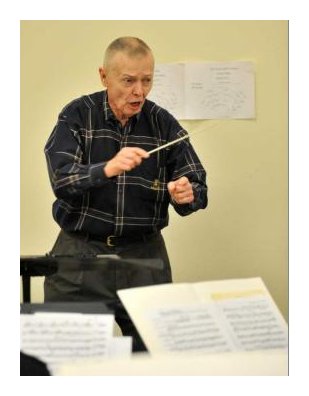 GG: It wouldn’t be
a bad idea. [Lots of
laughter] But there are a lot of very important composers who
have written for band, many names you
recognize such as Aaron Copland, Paul Hindemith, Arnold Schoenberg, Vincent Persichetti,
William
Schuman, Walter Piston, and many, many others. [Names which are links refer to my
Interviews elsewhere on my website.]
GG: It wouldn’t be
a bad idea. [Lots of
laughter] But there are a lot of very important composers who
have written for band, many names you
recognize such as Aaron Copland, Paul Hindemith, Arnold Schoenberg, Vincent Persichetti,
William
Schuman, Walter Piston, and many, many others. [Names which are links refer to my
Interviews elsewhere on my website.]
BD: But it seems
that they’ve done mostly symphonic
and chamber works, and then dabbled for band, rather than being ‘band
composers’ like like Nelhybel
or Ron Nelson.
GG: Persichetti
contributed a large
number of pieces to the band literature, but
that’s a fair comment.
BD: Why is it that
we have professional
orchestras around the country and
around the world, but we don’t seem to have a lot of professional
bands? [When I asked this
question of Frederick
Fennell, he had a similar response.]
GG: There’s
certainly no easy answer to that, but I could maybe suggest a few
possibilities. One is
there’s not that long tradition. Another is in the minds of many
music ‘aficionados’, the band has sort of a bad rep. They
think of bands in terms of marching bands, and that means playing
trivial, cheap music. A lot of that we brought on ourselves, and
too often that is the case. This is a somewhat controversial
statement, but
the bands that are most highly thought of, the bands that
are probably regarded most highly are the service bands.
They’re wonderful bands. [See my Interview with
Captain William J. Phillips, Leader of the Navy Band.] It is
better now, but for much of their history they’ve traveled the country
playing mostly transcriptions, highlights from
Broadway shows, and a lot of marches, and not really very heavy or
serious concert fare. So that all contributes to their perception
of the band being a rather inferior medium of music performance.
BD: Is it safe to
assume that in your career
you tried to elevate the level of material put in front of the students?
GG: I don’t want
to sound too stuffy about it, but I did try to do that. Whether I
succeeded or not, I don’t know.
BD: I assume you
must have a number of alumni from your
bands who are now leading bands and orchestras.
GG: We have a
tremendous number of our former students
who are out teaching, and a great many of them, I’m happy to say, with
notable success. I don’t mean to sound
like a braggadocio at all
because I was not the only one, just a small part. We have a
wonderful music faculty here, and they all
contributed. One of the great things about this particular
school is that music education is not looked down upon, as it is in so
many places. Music education often is something thing you do if
you’re really not a very good performer. But throughout our
faculty,
everybody recognizes that it’s a noble calling, and that we need
talented, dedicated people in that field.
BD: It’s well
known all over that students from
Texas have a reputation for being first-rate musicians and first-rate
educators.
GG: Well, we in
Texas, think so! [Laughs]
BD: Isn’t it part
of your job to inspire as much
leadership as you can, as well as musicianship?
GG: That certainly
is the goal, yes.
*
* *
* *
BD: You’d grown
up with bands, and been a woodwind and brass man. Was it
difficult to then assume the orchestral
leadership?
GG: It was a new
challenge to be sure, and one that I
was very eager to take on. In many ways there’s no
difference. Music is music; quarter notes still get a
count in four-four time; it’s either in tune or it’s out of tune; it’s
either a phrase beautifully shaped or it’s not. There are far
more similarities than differences. The main differences between
stringed instruments and wind
instruments are in the manner of playing. That’s why I was eager
to study
violin so I would be a little bit better informed about the
problems with playing stringed instruments, and instructing the string
players.
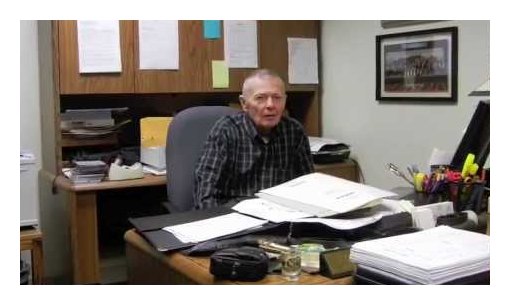 BD: You did all of this
for many, many years. Did
you find that the general level of musicianship got higher and
higher each year?
BD: You did all of this
for many, many years. Did
you find that the general level of musicianship got higher and
higher each year?
GG: For many years
that was the case, but you reach a point at some time after enough
years where
you can’t continue to be going uphill all the time. As I look
back on it, there would be occasional dips where the band may not be as
good in some
respects as it was the previous year, and maybe in other respects it
was
better. The pendulum swings back and forth, and maybe
Section A will be down a little bit, and Section B will be
terrific. Then the leadership people in Section B graduate, and
the
people in Section A mature and come into their own. So there are
a lot
of little vacillations like that. I’m not sure that I would want
to say publicly which of the bands I
thought were the best. Many of them were...
BD: That’s just
putting
together the all-stars, but the general level though has kept up?
GG: Overall, yes,
probably so.
BD: Was it at all
frustrating for you to know that you
would work with the students, and nurture them for two, or three, or
four, or perhaps five years, and then they’re gone?
GG: [Laughs]
We had one student that was in
the band for eleven years! [Both laugh] He was a wonderful
player, and he just liked to go
to school. He was a pro when it came to
dropping classes, and he did that mainly because he didn’t want
to graduate. He wanted to hang around, but his dad
finally pulled the plug on that, so he went to classes and
graduated. But not very many of them anymore seem to graduate in
four years unless they also go in summers and take great heavy
loads.
It’s not at all that common. In fact, it’s quite common for them
to take five years, and not infrequently, more than that. But as
to your question, the saddest time of every year
for me was always the last concert because I knew when I gave that
final cut-off, that group would never ever be in the same place at
the same time again. It effectively ceased to exist, and it was
almost like a death in the family to me. It was always a
very emotional moment for me. I hated that time.
BD: Then in
September you had to start all over
again — not from scratch but from a few steps
back — and rebuild
and rebuild?
GG: I don’t mind
starting over. I like
that, and I love the rehearsals. The rehearsals are the best part
of it.
BD:
[Surprised] Really??? More than the performance?
GG: Yes. Not
that I didn’t enjoy
the performances, because I did and do, especially if they come off
well. But it’s the rehearsals where the real
teaching and congealing of the ensemble takes place. There is the
opportunity for communication, not just from the podium to the
ensemble, but from the ensemble back to the podium. It’s a
two-way process,
and it’s a very exciting one to me. I’m not at all
unusual in that way. I’ve heard a lot of conductors say exactly
the same thing. It’s the rehearsals that are great. That’s
what I miss the most — the daily musical give
and take.
BD: For any
particular concert, about how many
rehearsals did you have?
GG: That varied a
lot. I never even
stopped to think of it quite in those terms. In our case we
had four fifty-minute rehearsals a week, and then I excused the Friday
rehearsal in return for a section rehearsal with each section. So
that
was twelve sections. I’d have twelve one-hour section rehearsals
a week, plus four fifty-minute full rehearsals. I don’t know
how many rehearsals we normally had for a performance. Sometimes
it might be very few, sometimes it could be quite a few. It
depended a lot on how much we’re music playing, and the difficulty of
the music.
BD: Was it ever
enough time to rehearse?
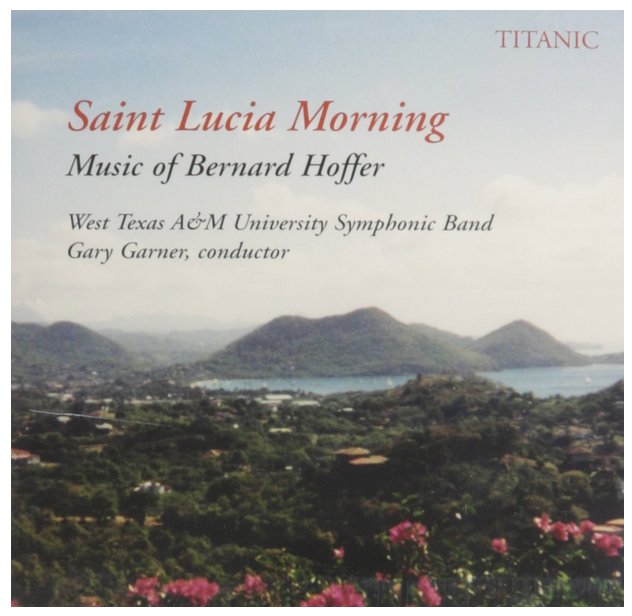 GG: I remember several
years ago when we had Donald
Neuen, who was at that
time the director of choral activities at Eastman, in Rochester, New
York, came one summer. He had to do a choral workshop, and
another seminar they had. One of the students asked how much is
enough rehearsal, and he said, “There’s no such
thing as enough
rehearsal. You just keep rehearsing up till the time of the
concert, and then you perform.” But then
there are other people
that’ll say it’s possible to have too much rehearsal. As a matter
of fact, I’m one of those. I think that’s true. I think it
is possible
to have too much rehearsal. Then there’s no immediacy. It
tends to
dilute the immediacy of the rehearsal process, and take the pressure
off. Invariably where you have an excessive amount of time,
there’s still that last minute panic just as there was when there was
not enough time. Nowadays you can say there have been a lot of
performances that I’d conducted that I wished we’d had another
rehearsal or two, or that I had utilized the rehearsal time to better
effect.
GG: I remember several
years ago when we had Donald
Neuen, who was at that
time the director of choral activities at Eastman, in Rochester, New
York, came one summer. He had to do a choral workshop, and
another seminar they had. One of the students asked how much is
enough rehearsal, and he said, “There’s no such
thing as enough
rehearsal. You just keep rehearsing up till the time of the
concert, and then you perform.” But then
there are other people
that’ll say it’s possible to have too much rehearsal. As a matter
of fact, I’m one of those. I think that’s true. I think it
is possible
to have too much rehearsal. Then there’s no immediacy. It
tends to
dilute the immediacy of the rehearsal process, and take the pressure
off. Invariably where you have an excessive amount of time,
there’s still that last minute panic just as there was when there was
not enough time. Nowadays you can say there have been a lot of
performances that I’d conducted that I wished we’d had another
rehearsal or two, or that I had utilized the rehearsal time to better
effect.
BD: Was there ever
a case when you
purposely left something out so that there would be a special spark on
the night of performance?
GG:
[Decisively] No! [Both laugh] Neither do I
subscribe to the theory that a bad dress rehearsal means a good
concert. That’s a myth, at least in my
experience. I’ve had some bad dress rehearsals that
were followed by
bad concerts.
BD: Were you able
to coordinate the band and
orchestra programs with the rest of the ideas and classes and
lessons that were going on at the school of music?
GG: In some ways
there were. When our music history teacher would
be doing a seminar on Mozart, for example, he would want to
coordinate that with the playing of a Mozart symphony. That did
happen a number of times. Then there’s also a departmental
policy — this more of a pedagogical thing
— where we would all use the same
rhythmic counting systems so that the students would be getting the
same
thing in their theory class, in their individual private lessons,
and in their ensemble rehearsals — rather than
the ensemble
conductor using one counting system, and the private teacher using
another, and the theory teacher using still another, which would tend
to lead to confusion. So we did have a stated and unstated
departmental policy that would be all coordinated and uniform
throughout the department.
BD: In your
ensembles, were most, or all, music majors, or were some non-music
majors?
GG: In the
symphonic band, the top band, there would
usually be one or two or three non-music majors, but
almost all were music majors. Then there were some times when
there
were no non-music majors, but usually there would be two or three very
serious musicians who happened to be majoring in something outside
music. They were, without fail, wonderful band members and very
dedicated.
BD: Did you also
have the lower bands as well as the
top bands?
GG: I did for a
number of years, and then in 1987 we
brought in a second person who succeeded me that year. He was an
incredibly
talented musician. Up to that point I
had been doing both bands, and when he came on board, then he
took over what we call Concert Band.
BD: The Concert
Band would have a lot more
non-majors?
GG: Yes, they
would have more.
BD: Is there
anything different in your mind when
you’re giving a down-beat to non-majors as opposed to all majors?
GG: No. They
either respond or they don’t. They either play the right note or
they
don’t, and if they don’t, then it’s your job to try and lead them
to the right note.
BD: I just
wondered if there was some little
preparation, or a few extra things you would say at the beginning of
the rehearsal that
you would not say to those who were music majors.
GG: No, not for
me. Maybe somebody else would
feel differently but I certainly never thought of it in those terms.
*
* *
* *
BD: What’s the
purpose of music?
GG: [Surprised at
the question] Oh, God! I don’t know, and I don’t think
anybody else does. It’s a platitude, but music ennobles
and enriches the human soul. Fundamentally, as we know
throughout recorded history, human beings are incapable of existing
without it. We’ve got to have the arts in
general, whether it’s a drawing on a cave wall somewhere or the most
sophisticated twenty-first century art work in any medium. We
can’t exist without
it, we just can’t. Why that is I don’t know, but it
certainly seems to be ingrained, and it’s in that human gene pool, and
sure to stay as long as there are
humans around!
BD: Are you
optimistic about the whole future of
music, either performance or composition?
GG:
[Reluctantly] Well, yes and no. There seems to be a wide
chasm between the public and contemporary composers, which
has not been true throughout the course of music. I
guess this is the old fogey in me, but I think popular music is at such
an
all-time low. It’s depressing, and the pattern seems to
continue. Ever since I’ve known anything about it or have been
involved
in it, you go through periods of economic austerity
where the first thing that they want to cut is the arts. When the
Russian Sputnik went up in 1957, all of a
sudden there was this hue and cry around the country that, “The
Russians are
ahead of us! We need more math and science,”
and music and the
arts were under considerable assault for a while. I was
very much part of that era. I was just a young teacher then, and
it was
very alarming. So we go through periods like that, and here we
are
at a time where our nation’s economy is very tenuous, to say the least,
and I’m sure we’re going to hear a lot of that. In Alabama right
now they’re even thinking about
cutting out athletics! [Both laugh] But if athletics go,
you can be sure music’s going to go very soon. People seem to
think of music too
often as a frill. Well, it’s not a frill. Let’s face it,
instrumental music is a pretty expensive
proposition, but when it’s done right, there’s a tremendous
return. So I don’t know whether to be optimistic or not.
I’m
sure in the long-term things will be just fine, but these are difficult
times.
BD: You, as an
instructor, have to prepare the
youngsters for good times and bad.
GG: That’s true,
yes, and part of my assignment for much of my tenure was teaching
senior music methods classes — instrumental
music methods classes — and we’d talk about
things like that. They have to always be prepared to justify
their existence, and justify the very considerable expenditure that the
local school boards are putting forth to sustain their
programs. If they can’t do that, then they’ll be in real
jeopardy.
BD: They’ll be
looking for work elsewhere?
GG: That’s right,
and the real
losers will be the kids.
BD: I asked about
advice for
those who compose. What about those who want to conduct
bands? Do you have some advice for younger conductors coming
along?
GG: As far
as finding a job, that’s a wide-open field. There’s a
considerable shortage, at least in this state, of band directors right
now, and a serious shortage of orchestra teachers.
BD: Why is that?
GG: I’ve
done some research on this, and the really talented string players
— who are also very bright kids — are
likely to go into
medicine, or law, or engineering, heaven knows what.
BD: Anything but
music?
GG: Yes, and if
they do go into music, they think
they need to be performers, and most likely to want to go to an Eastern
conservatory. That’s a very tough road to make a career as a
player. It’s very hard because there’s such a vast pool of people
seeking employment in professional orchestras, and so few openings come
about. There might be a thousand applicants for a job, and you’re
very lucky
if you even get to audition. Statistically I always tell
kids, “Why don’t you plan to be a United States
Senator? There are a hundred of them, but if you’re a tuba
player and you get a degree in tuba, maybe there’ll be an opening
some time in the next ten years in an orchestra, and maybe you’ll be
one
of the thousand people that’ll apply for it.”
So that’s a
very, very difficult career goal, but there are jobs that come about
occasionally, and somebody will get them. They just have to be
realistic and understand that the odds are stacked badly
against them.
BD: Let’s now
assume that someone has
beaten the odds and is the conductor. What kind of advice do you
have for the working conductor?
GG: You mean in a
public school situation?
BD: Or in a
university situation.
GG: What they need
to do is prepare for it. They need to do a number
of things. First of all, they need to be the best
performers they can. If
you’ve never really made music at a very high level, it’s not
likely you’re going to teach anybody to play at a very high
level. They need to be as serious as they can about
music
theory, and learn how music works. They need to know something
about music history — which is something that I
certainly poo-pooed at
one time in my life — and they need to know as
much repertoire as they
can. They need to study the repertoire for that medium, and hear
as many performances as they can, see as many rehearsals as they can,
observe as many conductors as they can, see what they like and what
they
don’t like, find what they want to use and what they want to avoid,
because you learn something from everybody — even
if
it’s what not to do. They would be very well advised
to do what I didn’t do, which is to develop at least a modicum of
keyboard expertise, and continue to try to develop aural acuity,
as well as just the mechanical act of conducting. It’s something
that needs to be studied and
practiced. It’s like playing an instrument.
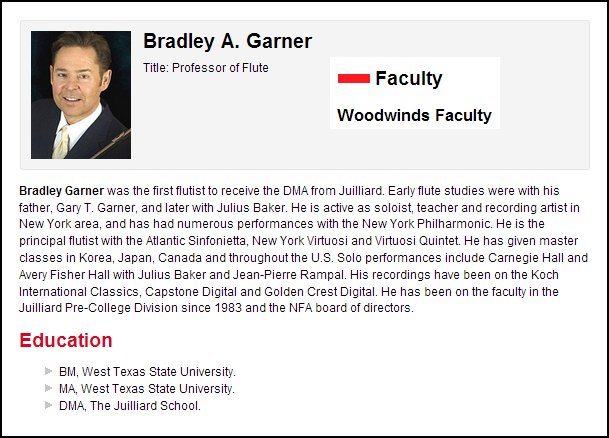 BD: You did take some of
your advice by becoming a first-rate flute player. Tell me about
some of the joys
and sorrows of being a flute player — or do you say
‘flautist’?
BD: You did take some of
your advice by becoming a first-rate flute player. Tell me about
some of the joys
and sorrows of being a flute player — or do you say
‘flautist’?
GG: I call it
‘flutist’, or as my son would say
a ‘flutician’! [Laughs] Actually he borrowed that from his
teacher, Julius
Baker. The flute turned out to be a good
instrument for me. I seem to be fairly well suited to it, and
there are great things about. Because most the flute
players are girls, if you’re only guy in a section of girls, that’s
not bad. [Laughs] And you get to play the melody all the
time. It’s very portable. It’s a lovely instrument, and
there’s a lot of
great flute literature.
BD: Both solo and
for flute ensemble?
GG: Yes... well, I
don’t know if I would say there is a lot of
great flute ensemble literature. There’s a lot of flute ensemble
literature, but I don’t know how much of it is
great. Forgive
the immodesty, but my son’s the best flute player I know of, and he has
an
unbelievable flute studio at the Cincinnati Conservatory that’s highly
selective, and he avoids ‘flute choirs’ like the plague. Even
though he’s got all these
wonderful players at his disposal, he just doesn’t think there’s much
really good music.
BD: Does he
discourage it, or does he just simply
leave it to someone else?
GG: I don’t know
that he discourages anybody
else doing it, but he just says there’s not enough good music to
justify spending time on
it. But there’s certainly a wealth of good solo material,
and the orchestral repertoire is replete with wonderful
flute parts. So it’s a great instrument to
play. You don’t have to worry about reeds, which is a very
big plus, and you don’t have to worry about chops in the way that brass
players do. So in strictly practical ways, I can’t imagine why
anybody else would play anything else, to tell you the truth.
[Laughs again]
BD: [With a gentle
nudge] But you don’t want everyone to play flute.
You need the whole rest of the orchestra.
GG: Although
sometimes these days, it seems as if
everyone is. If you’ve ever gone to an annual meeting of the
National Flute Association, flute
players turn out by the thousands. It’s mind-boggling. I’m
sure they represent just a small proportion of the
flute players around the country. When I was a
kid and started playing the flute, there were not many flute
players. But now, my gosh, they just multiply like
nobody’s business.
BD: I assume every
flute player should also play
piccolo, and alto flute, and bass flute?
GG: No, not
necessarily. A lot of flute players
don’t like to play piccolo, and I’m one of them. I never really
cared much
for playing piccolo. But then there are a lot of people who
specialize on the flute, and I notice there are a lot of wonderful
piccolo players who are not as good on flute as they are on
piccolo. This is not always the case, of course. Alto
flute’s a lot of fun
to play, and you don’t often need a bass flute! I probably
haven’t spent an hour on a bass
flute in my life, but it’s fun to play.
BD: You should
write a concerto for bass flute.
GG: There may be
one, but you hear it in movie scores and sometimes in
commercial music. A lot of ‘flute
choir’ music calls for bass flute.
*
* *
* *
 BD: One last
question. Is conducting fun?
BD: One last
question. Is conducting fun?
GG: Conducting is
way beyond fun. It’s exhilarating, and I do warn my
students about this. There’s such a sense of power that sweeps
over you up on that podium, where you’re in total control of all these
people in front of you, it’s sometimes
easy get a little too carried away with it.
BD: Are you in
control, or are you just trying
to bring out everything that’s in the score?
GG: You’re in
control in the sense that you
could tell them what to do. Whether or not they’re able to do
it is quite another matter, but you’re in charge. It is
easy, especially in a school situation, to abuse that
if you’re not careful. This is something a lot of people have to
be careful to avoid.
BD: You’ve retired
from WT?
GG: I still get
back there a little bit. I taught
at the band camp again this summer, and I help with a band clinic they
have in the spring. In the spring I do a lot of band clinics for
high school and bands. Last year I began volunteering my time at
a local high
school. It all began actually when I was visiting a former
student who’d had an appendectomy at the hospital
here. A Pink Lady was
showing me her room, and I was thinking what a nice thing it was that
this woman was volunteering her time in this way. So I needed to
do that, too. For some reason they rejected my application to be
a
Pink Lady [winks], but I had been giving some serious
thought about how I might do some volunteer work, when finally the
obvious came to me. The one thing I’d like to do most, and
perhaps do
the best, is work with school instrumental ensembles. So I
called a former student of mine, who is a director at a local high
school, and told him I’d be glad to come out one day a week and help in
whatever way he’d like, and he was kind enough to say yes. So I
did that one day a week for a week or two, and had so much fun, I
started doing it two times a week. Before I knew it, I was going
out there every day, and probably will do the same thing again this
year. So that’s taken up some time, but it’s been a most
pleasurable pursuit for me.
BD: Thank you for
all you have given to music, and I
hope you continue to have lots of great success.
GG: You’re very
kind, and I join you in that
hope. Thank you.
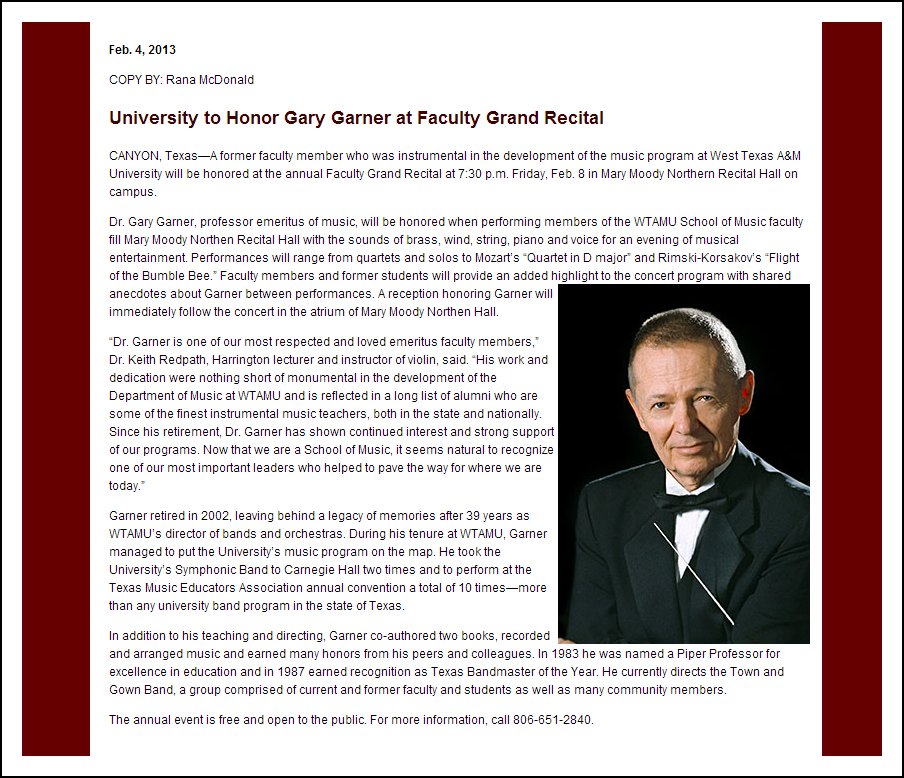
© 2003 Bruce Duffie
This conversation was recorded at his home in Texas in
September, 2003. Portions were broadcast on WNUR in 2006, and
on Contemporary Classical Interenet Radio in 2007 and 2013.
This transcription was made in 2017, and posted on this
website
at that time. My thanks to British soprano Una
Barry for her help in preparing this website
presentation.
To see a full list (with links) of interviews which have been
transcribed and posted on this website, click here.
Award
- winning
broadcaster
Bruce Duffie was with WNIB, Classical 97 in Chicago from 1975
until
its final moment as a classical station in February of 2001. His
interviews have also appeared in various magazines and journals since
1980,
and he now continues his broadcast series on WNUR-FM, as well
as
on Contemporary Classical Internet Radio.
You are invited to visit his website
for more information about his work, including selected transcripts of
other interviews, plus a full list of his guests. He would also
like
to call your attention to the photos and information about his
grandfather, who was a pioneer in the automotive field more than a
century ago. You may also send him E-Mail
with comments, questions and suggestions.
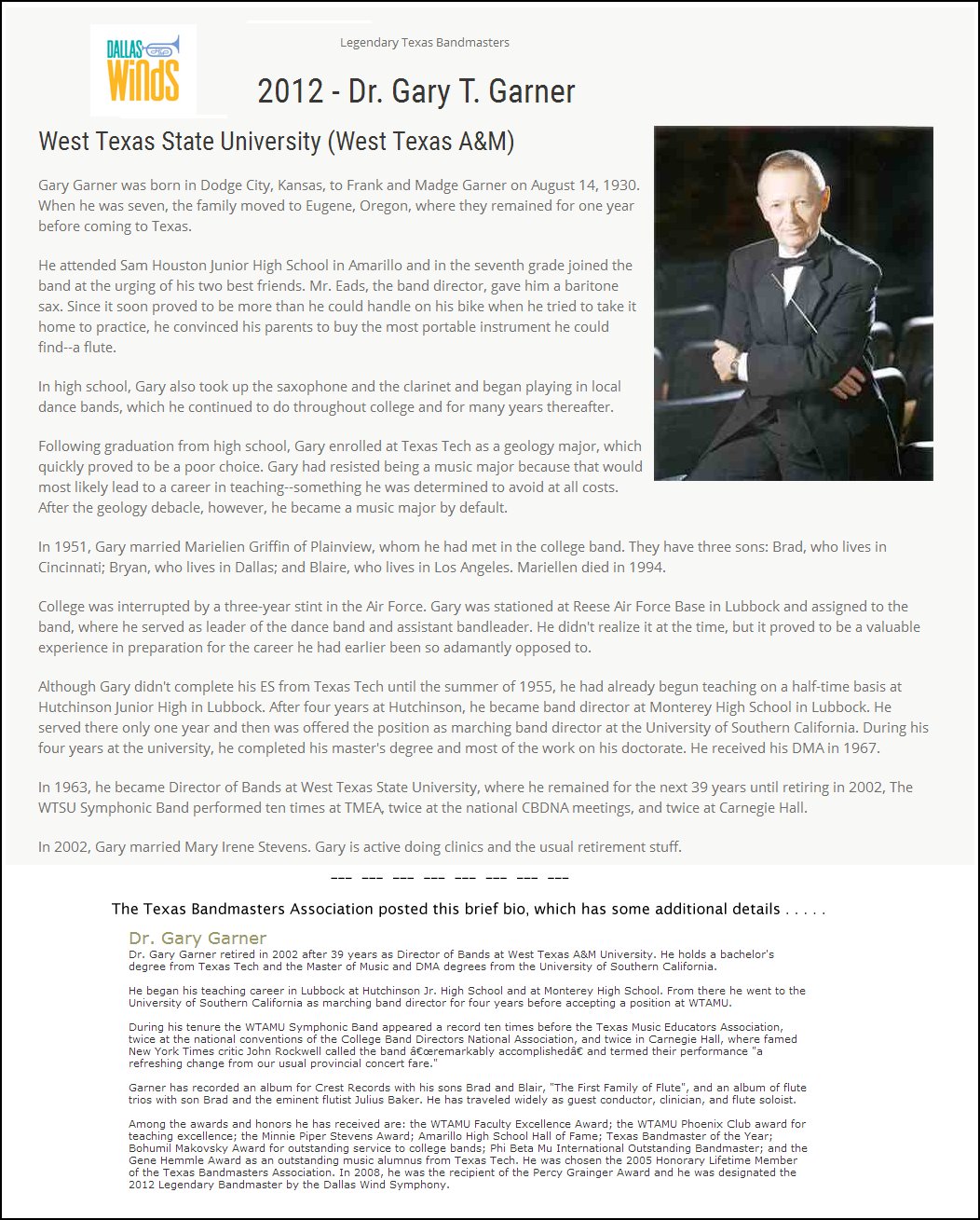

 The
next leg of our journey was west, across the deep south to Texas,
to visit Kathy’s
mother in Plainview. It was there that Kathy, a graduate of WT,
and who had played clarinet in Garner’s
ensemble for several years, contacted her former bandmaster and
arranged for this interview before we headed back home to Chicago.
The
next leg of our journey was west, across the deep south to Texas,
to visit Kathy’s
mother in Plainview. It was there that Kathy, a graduate of WT,
and who had played clarinet in Garner’s
ensemble for several years, contacted her former bandmaster and
arranged for this interview before we headed back home to Chicago. BD: When you were
directing
bands at WT, did you also conduct orchestras?
BD: When you were
directing
bands at WT, did you also conduct orchestras? GG: It wouldn’t be
a bad idea. [Lots of
laughter] But there are a lot of very important composers who
have written for band, many names you
recognize such as Aaron Copland, Paul Hindemith, Arnold Schoenberg, Vincent Persichetti,
William
Schuman, Walter Piston, and many, many others. [Names which are links refer to my
Interviews elsewhere on my website.]
GG: It wouldn’t be
a bad idea. [Lots of
laughter] But there are a lot of very important composers who
have written for band, many names you
recognize such as Aaron Copland, Paul Hindemith, Arnold Schoenberg, Vincent Persichetti,
William
Schuman, Walter Piston, and many, many others. [Names which are links refer to my
Interviews elsewhere on my website.] BD: You did all of this
for many, many years. Did
you find that the general level of musicianship got higher and
higher each year?
BD: You did all of this
for many, many years. Did
you find that the general level of musicianship got higher and
higher each year? GG: I remember several
years ago when we had Donald
Neuen, who was at that
time the director of choral activities at Eastman, in Rochester, New
York, came one summer. He had to do a choral workshop, and
another seminar they had. One of the students asked how much is
enough rehearsal, and he said, “There’s no such
thing as enough
rehearsal. You just keep rehearsing up till the time of the
concert, and then you perform.” But then
there are other people
that’ll say it’s possible to have too much rehearsal. As a matter
of fact, I’m one of those. I think that’s true. I think it
is possible
to have too much rehearsal. Then there’s no immediacy. It
tends to
dilute the immediacy of the rehearsal process, and take the pressure
off. Invariably where you have an excessive amount of time,
there’s still that last minute panic just as there was when there was
not enough time. Nowadays you can say there have been a lot of
performances that I’d conducted that I wished we’d had another
rehearsal or two, or that I had utilized the rehearsal time to better
effect.
GG: I remember several
years ago when we had Donald
Neuen, who was at that
time the director of choral activities at Eastman, in Rochester, New
York, came one summer. He had to do a choral workshop, and
another seminar they had. One of the students asked how much is
enough rehearsal, and he said, “There’s no such
thing as enough
rehearsal. You just keep rehearsing up till the time of the
concert, and then you perform.” But then
there are other people
that’ll say it’s possible to have too much rehearsal. As a matter
of fact, I’m one of those. I think that’s true. I think it
is possible
to have too much rehearsal. Then there’s no immediacy. It
tends to
dilute the immediacy of the rehearsal process, and take the pressure
off. Invariably where you have an excessive amount of time,
there’s still that last minute panic just as there was when there was
not enough time. Nowadays you can say there have been a lot of
performances that I’d conducted that I wished we’d had another
rehearsal or two, or that I had utilized the rehearsal time to better
effect. 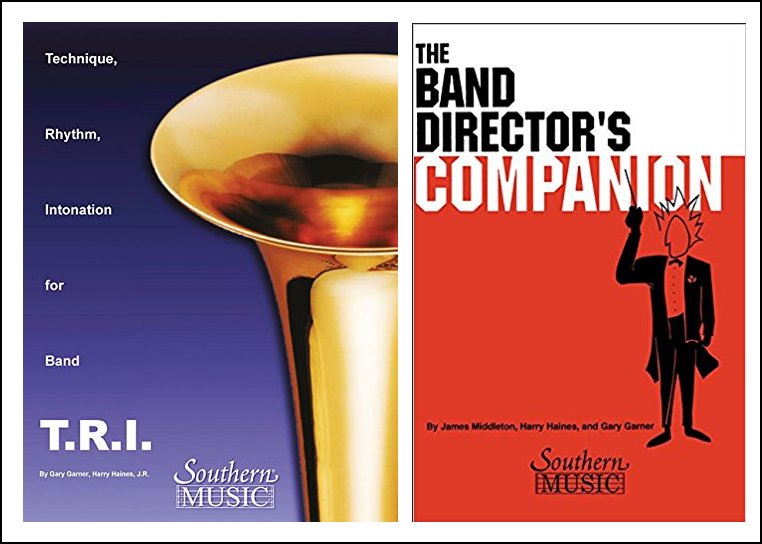
 BD: You did take some of
your advice by becoming a first-rate flute player. Tell me about
some of the joys
and sorrows of being a flute player — or do you say
‘flautist’?
BD: You did take some of
your advice by becoming a first-rate flute player. Tell me about
some of the joys
and sorrows of being a flute player — or do you say
‘flautist’? BD: One last
question. Is conducting fun?
BD: One last
question. Is conducting fun?